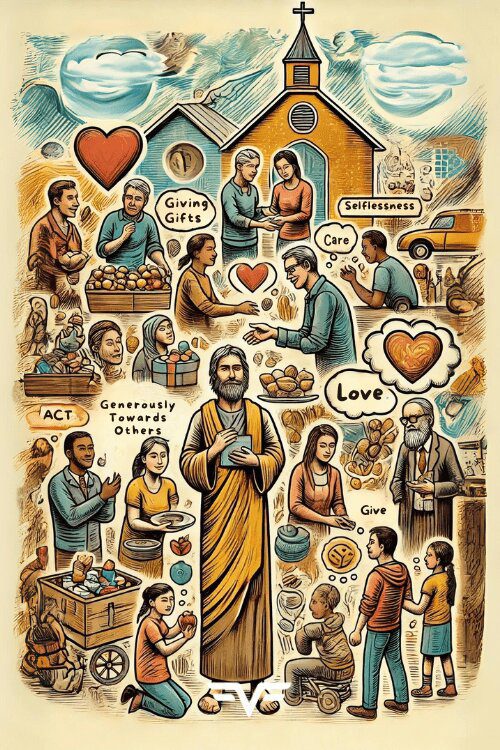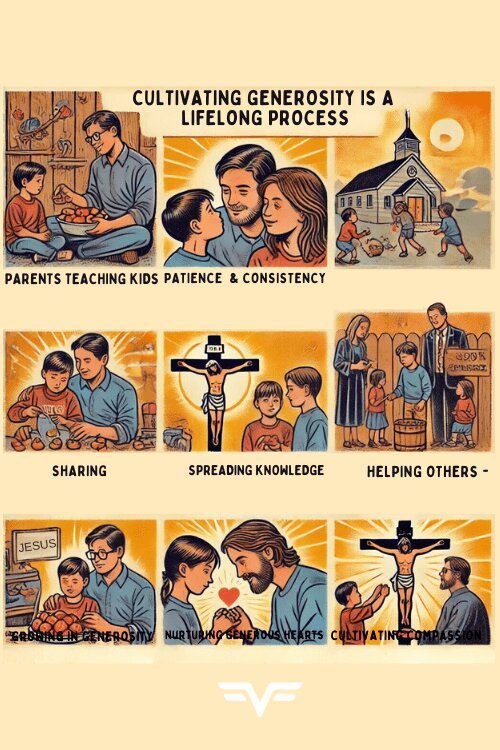Nurturing tomorrow's heroes Today!
Character Chronicles
Generosity
Index
Introduction
Generosity is a core principle in Christianity, deeply rooted in God’s character and His expectations for His followers. In 2 Corinthians 9:7, we’re reminded that “God loves a cheerful giver.” But what does this mean for us and our children?
Biblical generosity goes beyond simply giving money or possessions. It’s a heart attitude that reflects God’s love and grace. It involves:
- Giving freely without expecting anything in return (Luke 6:35)
- Sharing not just our resources, but also our time and talents (1 Peter 4:10)
- Responding to others’ needs with compassion (1 John 3:17)
- Giving sacrificially, even when it’s not convenient (Mark 12:41-44)


The Importance of Generosity in Christian Life
Generosity isn’t just a nice trait to have; it’s an essential part of our Christian walk. Here’s why it’s so important:
- It reflects God’s character: God is the ultimate example of generosity, giving us His only Son (John 3:16).
- It combats selfishness and materialism: Generosity helps us focus on others and eternal values rather than worldly possessions (Matthew 6:19-21).
- It builds community: Generous acts strengthen relationships and create a culture of care (Acts 2:44-45).
- It increases our faith: When we give, we learn to trust God’s provision more (Philippians 4:19).
- It brings joy: There’s a unique happiness that comes from giving (Acts 20:35).
Modeling Christ-like Generosity as Parents
Children learn best by example, so it’s crucial that we model generosity in our daily lives:
- Practice tithing and explain its importance to your children.
- Volunteer regularly as a family in your church or community.
- Show hospitality by inviting others into your home for meals or fellowship.
- Discuss your family’s giving decisions and involve children in the process.
- Demonstrate generosity in everyday situations, like helping a neighbor or sharing with a stranger in need.
Remember, our goal is to reflect Christ’s generosity: “For you know the grace of our Lord Jesus Christ, that though he was rich, yet for your sake he became poor, so that you through his poverty might become rich” (2 Corinthians 8:9).

Teaching Generosity to Kids
5-8 Year Olds
For younger children, focus on concrete examples and simple concepts:
- Use Bible stories to illustrate generosity (e.g., the boy with five loaves and two fish in John 6:1-14).
- Create a “Blessing Jar” where kids can contribute a portion of their allowance for giving.
- Encourage sharing toys and taking turns, relating it to how Jesus shared His love with everyone.
- Involve them in preparing care packages for missionaries or local outreach programs.
- Read children’s books that emphasize generosity and discuss the lessons.
9-13 Year Olds
As children grow, help them develop a more mature understanding of generosity:
- Study Bible passages about giving together and discuss their implications.
- Encourage them to use their talents to serve in the church (e.g., joining the worship team, helping in Sunday School).
- Help them plan and execute their own charitable projects aligned with their interests.
- Teach responsible financial stewardship, including budgeting for giving.
- Discuss global issues and how Christians can respond generously to world needs.

Overcoming Obstacles to Generosity
Address common challenges that may hinder generosity from a biblical perspective:
- Fear of scarcity: Teach trust in God’s provision (Matthew 6:25-34).
- Peer pressure: Discuss standing firm in faith and values (1 Timothy 4:12).
- Entitlement: Foster gratitude by regularly counting blessings (1 Thessalonians 5:18).
- Lack of empathy: Expose them to diverse experiences and stories, emphasizing our common humanity in Christ (Galatians 3:28).


Generosity Beyond Material Things
Remind children that generosity encompasses more than money or possessions:
- Encourage them to be generous with forgiveness, relating it to God’s forgiveness of us (Ephesians 4:32).
- Teach the value of giving time and attention to others, just as Jesus did.
- Discuss how using their God-given talents to help others is a form of generosity.
- Highlight the importance of prayer as a generous act of interceding for others.
Conclusion
Cultivating generosity in our children is a lifelong process that requires patience, consistency, and most importantly, a reliance on God’s guidance. By nurturing generous hearts in our kids, we’re not only helping them become more Christ-like but also preparing them to be light and salt in the world (Matthew 5:13-16).
Remember, the goal isn’t perfection, but progress. Celebrate small acts of generosity and continually point your children back to the ultimate example of generosity: Christ’s sacrifice for us.

Fuel Your Faith! Join Our Heroic Email List
Unlock Daily Challenges, Hero Training & Faith-Filled Inspiration!


